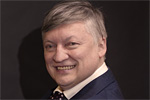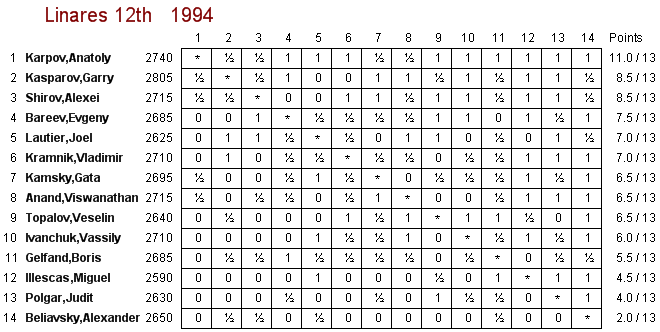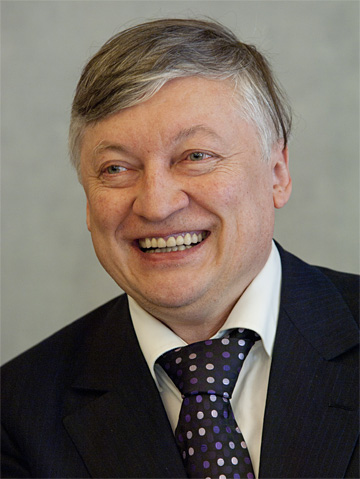



Born on May 23, 1951, in Zlatoust in the Urals region of the former Soviet Union, Anatoly Yevgenyevich Karpov has become one of the great legends of chess history and one of the greatest players of all time. He was official World Champion from 1975 to 1985, played three more matches for the title from 1986 to 1990, then was FIDE World Champion from 1993 to 1999. Karpov's tournament successes include over 160 first-place finishes. His peak Elo rating was 2780, and he was number one on the FIDE rating list for a total of 90 months, a record broken only by Garry Kasparov in later years.
Anatoly learned to play chess at the age of four, rising to the rank of Candidate Master by the age of eleven. At twelve, he was accepted into Mikhail Botvinnik's prestigious chess school, though Botvinnik made the following remark about the young Karpov: "The boy does not have a clue about chess, and there's no future at all for him in this profession." Karpov acknowledged that his understanding of chess theory was very confused at that time, and wrote later that the homework which Botvinnik assigned greatly helped him, since it required that he consult chess books and work diligently. Karpov improved so quickly under Botvinnik's tutelage that he became the youngest Soviet National Master in history at fifteen in 1966; this tied the record established by Boris Spassky in 1952.
Here we interrupt our narrative to bring you a description of the young Anatoly Karpov by the editor of the Russian chess magazine "64 and former chess trainer Alexander Roshal, who died in 2007.
You may have some problems understanding the inimitable Alexander Roshal, who knew just a couple of hundred words of English, but used these better than anyone with a similarly limited vocabulary. Alexander was a trainer at the time of their meeting, a 2430 rated master, who played some blitz games against the 11-year-old chess prodigy Anatoly Karpov – with his students crowded around. Roshal tells us that while normal prodigies will sacrifice pieces and tear you to pieces, the young Karpov was different – "he would not give you a single pawn, not even a single square." After he had lost the first game against Karpov, Roshal asked the students around him to tell him what he had done wrong – turning the game into a didactic lesson for them. After losing three more he again asked his students to identify the mistakes he had made. "Why did I lose?" he asked. From Karpov came the timid suggestion: "Perhaps because I am a better player than you?"
In the Candidates' tournament after Fischer had gained the World Championship in 1972 Anatoly Karpov first defeat Lev Polugaevsky (+3 =5), then the former champion Boris Spassky (+4 -1 =6), and Viktor Korchnoi in the Candidates' final (+3 -2 =19), thus earning the right to challenge Fischer for the world title. However, Fischer insisted that their match be the first to ten wins (draws not counting), and that the champion would retain the crown if the score was tied 9–9. FIDE refused to allow this proviso and declared challenger Karpov the winner. This thrust the young Karpov into the role of World Champion without having faced the reigning champion. In his book My Great Predecessors Part V Garry Kasparov has argued that Karpov would have had good chances, because he had beaten Spassky convincingly and was a new breed of tough professional, and indeed had higher quality games, while Fischer had been inactive for three years.

An early picture: Anatoly Karpov in 1974, preparing to play Ulf Andersson

During his 1974 Candidates' match against Viktor Korchnoi (right)
Determined to prove himself a legitimate champion, Karpov participated in nearly every major tournament for the next ten years, creating a phenomenal streak of wins against the strongest players in the world. Karpov held the record for most consecutive tournament victories (nine) until it was shattered by Garry Kasparov (14). In 1978, Karpov's first title defence was against Korchnoi at Baguio in the Philippines. which he won +6 -5 =21. Three years later Korchnoi re-emerged as the challenger, and this time Karpov won the match (in Merano, Italy) handily with a +6 -2 =10 score.

Karpov reigned supreme until the emergence of his nemesis Garry Kasparov, who became his challenger in 1984. In their first match in Moscow, the victor was again to be the first to win six games outright. After taking a commanding lead Karpov was unable to wrap it up, and after 48 games (+5 -3 =40) the FIDE President Florencio Campomanes terminated the match, citing the health of the players. In the rematch, which was limited to 24 games (with Karpov remaining champion if the match should finish 12–12), Karpov surrendered the title to his opponent (+3 -5 =16).

Karpov fought Kasparov in three more world championship matches, in 1986 (London and Leningrad), 1987 (Seville), and 1990 (in New York and Lyons). All three matches were extremely close: in all three he had winning chances up to the very last games. All were won by Kasparov. In their five world championship matches Karpov scored 19 wins, 21 losses, and 104 draws in 144 games.
After the split between Kasparov and World Chess Federation Karpov had another chance to win the "FIDE world championship" by beating Jan Timman, who had lost the Candidates' match against Nigel Short, the challenger of the reigning champion Garry Kasparov. Karpov defended his FIDE title against Gata Kamsky (+6 -3 =9) in 1996. After that FIDE scrapped the old system of Candidates' matches, instead having a large knock-out competition for the title. In the first of these events, in 1998, Karpov was seeded straight into the final and defeated Viswanathan Anand (+2 -2 =2, rapid tiebreak 2:0). In the subsequent cycle, the format was changed, with the champion having to qualify. Karpov refused to defend his title, and ceased to be FIDE World Champion after the FIDE World Chess Championship of 1999.
As mentioned above Anatoly Karpov's tournament record is the stuff of legends. But his greatest triumph was in the 1994 Linares chess tournament. The field, which included Kasparov, Shirov, Kramnik, Anand, Kamsky, Topalov, Ivanchuk and Gelfand, had an average Elo rating of 2685, the highest ever at that time, making it the first Category XVIII tournament ever held. Impressed by the strength of the tournament, Kasparov had said several days before the tournament that the winner could rightly be called the world champion of tournaments.

Karpov during his record-breaking win of Linares 1994
Perhaps spurred on by this comment, Karpov played the best tournament of his life. He was undefeated and earned 11 points out of 13 possible (the best world-class tournament winning percentage since Alekhine won San Remo in 1930), finishing 2½ points ahead of second-placed Kasparov and Shirov. Many of his wins were spectacular (in particular, his victory over Topalov is considered possibly the finest of his career). This performance against the best players in the world put his Elo rating tournament performance at 2985, the highest of any player in history up until 2009, when Magnus Carlsen won the category XXI Pearl Spring chess tournament with a performance of 3002.

Click to view the full table with tiebreaks and performance
Today Karpov is no longer active in competitive chess and usually limits his play to exhibition events at rapid time controls. In 2002 he won a rapid chess match against Kasparov 2½-1½, and in 2006 he tied for first with Kasparov in a blitz tournament, ahead of Korchnoi and Judit Polgár. Karpov and Kasparov played a mixed 12-game match from September 21–24, 2009, in Valencia, Spain, which Kasparov won 9-3.

In March 2010 Karpov announced that he would be a candidate for the presidency of FIDE. The election took place in September 2010 at the 39th Chess Olympiad. In May a fund-raising event took place in New York with the participation of his former rival Garry Kasparov and of Magnus Carlsen, both of whom supported his bid and campaigned for him. Nigel Short also supported Karpov's candidacy. However, on September 29, 2010, Kirsan Ilyumzhinov was reelected as President of FIDE, winning the election by 95 votes to 55.

In his election campaign Karpov was supported by his old rival Garry Kasparov
Russian readers should watch out on Monday for Garry Kasparov appearing on almost all the national news channels with statements on his great rival Anatoly Karpov. This is especially noteworthy since Kasparov has been non grata for a number of years on Russian TV, owing to his fierce opposition to the Russian government. But on the occasion of Karpov's 60th birthday he was interviewed by all major channels, who are apparently ready to break the embargo.

We wish you a very Happy Sixtieth Birthday, Anatoly Yevgenyevich